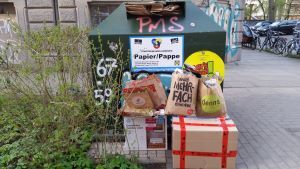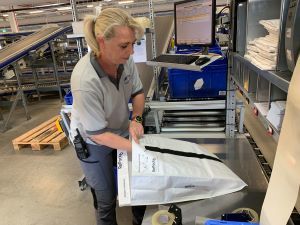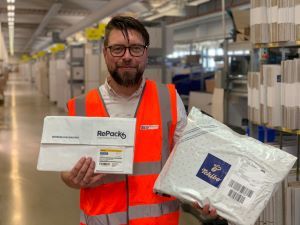Online shopping is growing steadily. The products are mostly packed in disposable packaging, which is disposed of by the end consumer. This system leads to a relevant consumption of resources and corresponding amounts of waste. Practical reusable systems for packaging in online and mail-order trade - as conceived, developed and tested in praxPACK - can make a considerable contribution to reducing the packaging-related consumption of resources and the amount of waste.

Packaging material in online shopping
Online shopping in Germany and Europe has been showing continuous growth for years. Products in online trade are mostly packed in one-way shipping packaging, which is disposed of upon receipt of the goods. This linear packaging system leads to a high consumption of resources and corresponding amounts of waste. Current studies show that private end consumers in Germany produce over 750,000 tonnes of paper, cardboard or paperboard packaging and over 50,000 tonnes of plastic packaging per year. A further growth of around 20 percent is expected in online trade by 2020. If the trend of steadily increasing resource consumption in this area is to be broken, innovative solutions at logistics system level and adjustments to business models will be required.
Here the “praxPACK” project comes in: The aim of the project is to contribute to the establishment and distribution of reusable systems in online trade in order to achieve a substantial reduction of packaging-related resource consumption - and associated waste quantities - in the medium term. For this purpose, the project, under the leadership of the network coordinator Ökopol, aims to develop and test practical reusable concepts in online trade and to gain comprehensive knowledge into how the business models of the actors involved in online trade need to be adapted in order to make the use of reusable systems economically viable.
This knowledge is to be prepared and made available in a systematic and application-oriented manner in order to support further responsible companies from online trade in testing and disseminating the use of reusable systems.

Cooperation laboratory and pilot project
The central element of praxPACK is a cooperation laboratory in which the project partners will develop concrete solution elements for the construction of practice-oriented and self-supporting reusable systems. The intensive exchange of experience and learning processes in the development of possible reusable concepts and necessary business model adaptations will play an important role in this process.
Based on the solution elements and reusable concepts developed jointly by the partners, reusable systems are being tested and further developed in concrete pilot projects at online retailers. These pilot projects will be conducted under the leadership of the three participating online retailers: Tchibo, OTTO and Avocado Store. The implementation of these pilot projects is supported by the expertise of the other partners involved: Cargo Plast, RePack (Plan B), GVM and the associated partners: DPDHL, Jokey, bevh, Händlerbund and the Stiftung Initiative Mehrweg. The Institute Ökopol is responsible for the coordination of the entire project.

Results (Status June 2022)
The environmental benefits of reusable shipping packaging have been demonstrated in various cases in which single-use packaging was compared with reusable packaging alternatives with regard to the carbon footprint.
The pilot test carried out in 2020 at Tchibo, OTTO and the Avocadostore, in which around 14,000 reusable packagings were sent to online retail customers, was comprehensively evaluated. On this basis, Tchibo is currently designing another pilot test that will take place in 2022.
The additional costs resulting from the lack of an efficient and cost-effective return solutions was clearly identified as a key obstacle to the broader establishment of reusable shipping packaging in e-commerce. In addition, various possible measures for optimizing customer involvement and packaging design were identified.
With regard to the cost situation of reusable shipping packaging, various scenarios were investigated. The additional costs that currently result per shipment from the use of reusable packaging compared to single-use packaging amount to 1.50 to 3 euros. Although customer surveys show a basic willingness to bear additional costs, these additional costs can be considered to be unacceptable in many cases.
Cooperation laboratory and pilot project
The central element of praxPACK is a cooperation laboratory in which the project partners will develop concrete solution elements for the construction of practice-oriented and self-supporting reusable systems. The intensive exchange of experience and learning processes in the development of possible reusable concepts and necessary business model adaptations will play an important role in this process.
Based on the solution elements and reusable concepts developed jointly by the partners, reusable systems are being tested and further developed in concrete pilot projects at online retailers. These pilot projects will be conducted under the leadership of the three participating online retailers: Tchibo, OTTO and Avocado Store. The implementation of these pilot projects is supported by the expertise of the other partners involved: Cargo Plast, RePack (Plan B), GVM and the associated partners: DPDHL, Jokey, bevh, Händlerbund and the Stiftung Initiative Mehrweg. The Institute Ökopol is responsible for the coordination of the entire project.
Online toolbox and recommendations for action
The findings from the cooperation laboratory are transferred to an online toolbox. This is intended to support interested online retailers in initiating and implementing a reusable system.
In addition, recommendations for action in terms of technical and sector policy will be derived. This includes the identification and analysis of existing obstacles for the broad establishment of reusable systems in online trade due to legal and sub-legal framework conditions and established industry standards of logistics service providers, the development of proposed solutions to overcome these obstacles and the derivation and coordination of recommendations. The addressees of these recommendations for action are the responsible departments in Germany and the EU as well as relevant industry committees.
Publications
Zimmermann, T. and Hauschke, F.: Assessing Reusable Packaging: The Importance of Methodological Choices in Carbon Footprint Calculation", sustainability 2024
Here you will find the results of the praxPACK final conference (11/02/2022)
Zimmermann,T., Marasus, S.: Mehr Mehrweg im Online-Handel, UmweltMagazin (2023), S. 22-23: https://www.ingenieur.de/wp-content/uploads/2023/09/UmweltMagazin_9-10_2023_UMW-9-10-2023.pdf
Zimmermann, T.: Project praxpack – making e-commerce more sustainable by reusable packaging, Waste Management World (2023): https://waste-management-world.com/resource-use/project-praxpack-making-e-commerce-more-sustainable-by-reusable-packaging
Project flyer of the funding measure (German / English) (March 2021)
The project flyers offer an insight into the contents and goals of the ReziProK projects and present first results in each case.
Project sheets of the funding measure (German) (August 2019)
The project sheets provide a brief overview of the individual projects and their goals.
Contributions to the ReziProK Transfer Conference in June 2022
Poster (German) (June 2022)
Presentation (German) (June 2022)
Contributions to the ReziProK Kick-off event im December 2019
Poster - in German (December 2019)
Presentation - in German (December 2019)
Picture credits: Till Zimmermann; Tchibo GmbH; Tchibo GmbH
